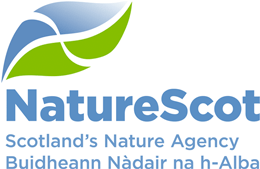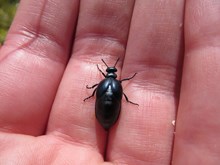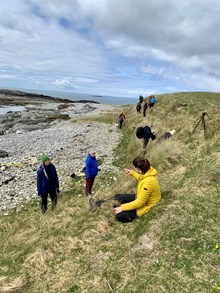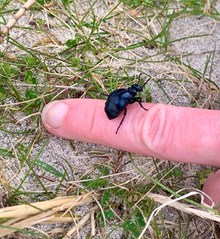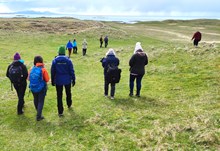17 May, 2023
Rare beetle found at Species on the Edge launch event in the Outer Hebrides
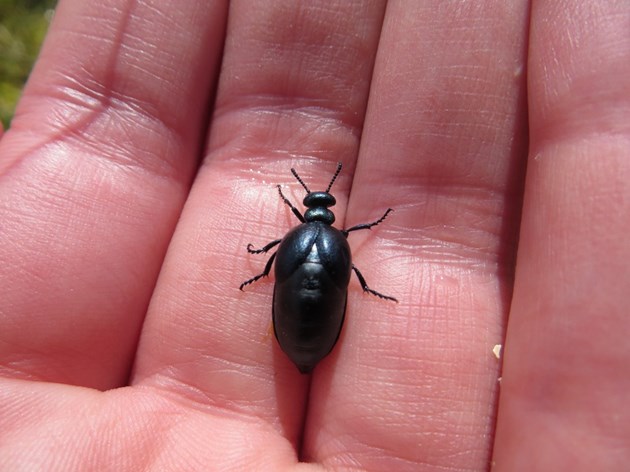
New multi-species conservation programme, Species on the Edge, kicked off public events in the Outer Hebrides with a short-necked oil beetle workshop on North Uist which saw 24 of the incredibly rare species found during the event.
After hearing about the success of the event on social media, enthusiasts on Tiree went searching for the beetle and were also successful, marking the first time short-necked oil beetles have been found on Tiree.
Species on the Edge is a new bold and ambitious partnership programme of eight conservation organisations, all dedicated to improving the fortunes of 37 priority species found along Scotland's coast and islands. Programme activity is spread over seven project areas: the Inner Hebrides and Argyll; Solway; the East Coast; the North Coast; Orkney; Shetland; and the Outer Hebrides.
Species on the Edge activity kicked off in the Outer Hebrides on Tuesday 25 April 2023 with their Outer Hebrides Launch Event. Attendees learnt more about the programme as well as one of the 37 target species, the short-necked oil beetle, at the North Uist Agricultural Centre, before heading out to the Balranald township to look for the rare invertebrates. It was a successful trip, with 24 beetles found by event hosts and participants.
Sally Morris, Buglife Conservation Officer, said “In 2020, the only known populations of short-necked oil beetles in Scotland were found on the Isle of Coll. Thanks to increased awareness through Species on the Edge, more populations have been found around Scotland. Short-necked oil beetles are rare in Great Britain and vulnerable to extinction due to their small, scattered populations. Presence of short-necked oil beetles are a great indicator of a healthy biodiverse ecosystem, as their lifecycle is linked to the northern colletes mining bee, a species that relies on flower-rich coastal grassland. Over the next four years, we will be talking to landowners about how they can manage their land to provide the right conditions for the short-necked oil beetle, and other invertebrate species.”
Fiona Strachan, NatureScot’s Species on the Edge Programme Manager said “It was great to be able to join the Outer Hebrides Species on the Edge team and take part in the first event of this exciting new programme. Finding short-necked oil beetles at a new site was fantastic and highlighted how much there still is to learn and discover about species living on our coasts and islands.”
The event also marked the launch of Buglife’s citizen science project, the Scottish Oil Beetle Search. Find out more about the Scottish Oil Beetle Search here: https://www.buglife.org.uk/scottish-oil-beetle-search/
Katy Malone (Bumblebee Conservation Trust), Outer Hebrides Area Manager for the Species on the Edge Programme, was excited about finding the rare beetle and the launch of public events in the Outer Hebrides: “This workshop marks the start of a four-year programme in the Outer Hebrides, and for me, it could not have gone any better. This is the first event of many that we have planned over the next four years. Residents and visitors should particularly watch out for the Outer Hebrides Wildlife Festival, which is being co-ordinated by the Bumblebee Conservation Trust over the next four years as part of the wider Species on the Edge programme.”
The Outer Hebrides Wildlife Festival will be taking place from Saturday 24 June to Saturday 01 July 2023 and is an opportunity for attendees to get closer to nature through guided walks, boat trips, outdoor activities, exhibitions and more. There is still time to contribute to the festival, whether by hosting an event, helping at events, or helping organise the festival. For more information and to get involved, email mairi.carrey@bumblebeeconservation.org.
The Species on the Edge partnership consists of Amphibian and Reptile Conservation, The Bat Conservation Trust, Buglife, the Bumblebee Conservation Trust, Butterfly Conservation, NatureScot, Plantlife and RSPB Scotland. Together the eight organisations will be delivering a four-and-a-half-year programme of work to tackle the impacts of environmental change on wildlife, to benefit both nature & people. The programme has a cost of over £6.5 million, with £4m of funding from the National Lottery Heritage Fund.
The target species on the Outer Hebrides include: great yellow bumblebee; dunlin; northern colletes mining bee; short-necked oil beetle; common pipistrelle bat; Arctic tern; lapwing; Irish lady’s tresses orchid.
Local communities are a key part of the Species on the Edge programme. Over the four and a half years, project officers based in each of the seven project areas will be working closely with those who live there to help them protect their local biodiversity. The programme will be offering opportunities to gain new skills and knowledge through workshops, training and volunteering. There will also be internships and mentoring opportunities.
Find out more about Species on the Edge on their website: https://www.nature.scot/scotlands-biodiversity/species-edge-sote/species-edge-about-project
Follow along with the programme on Twitter and on Facebook.
Contact information
- Name
- NatureScot Media
- Telephone
- 0131 316 2655
- media@nature.scot
Notes to editors
NatureScot is Scotland's nature agency. We work to enhance our natural environment in Scotland and inspire everyone to care more about it. Our priority is a nature-rich future for Scotland and an effective response to the climate emergency. For more information, visit our website at www.nature.scot or follow us on Twitter at https://twitter.com/nature_scot
The Bumblebee Conservation Trust is a membership charity that was established in 2006 due to serious concerns about the ‘plight of the bumblebee’. In the last 80 years many bumblebee populations have crashed and two species have become extinct in the UK. The Trust carries out science, conservation, and people engagement projects across the UK www.bumblebeeconservation.org
Buglife - The Invertebrate Conservation Trust is the only charity in Europe devoted to the conservation of all invertebrates. Our aim is to halt the extinction of invertebrate species and to achieve sustainable populations of invertebrates across the UK. We are working hard to achieve this through: Undertaking practical conservation projects that will contribute to achieving our aim. Promoting the environmental importance of invertebrates and raising awareness about the challenges to their survival. Assisting in the development of legislation and policy that will ensure the conservation of invertebrates. Developing and disseminating knowledge about how to conserve invertebrates. Encouraging and supporting invertebrate conservation initiatives by other organisations in the UK, Europe and worldwide.
Further information is available on Buglife’s website at www.buglife.org.uk, follow us on Twitter: @BuglifeScotland and ‘Like us’ on Facebook: Buglife – The Invertebrate Conservation Trust.
The Amphibian and Reptile Conservation Trust (ARC) is a national wildlife charity focusing on toads, frogs, newts, snakes, lizards and marine turtles. ARC conserves amphibians and reptiles, and the habitats on which they depend, to protect them for future generations. The Trust runs species recovery programmes, monitoring, scientific research, advocacy, outreach and regional projects. ARC owns 24 nature reserves and manages 80, covering 1,900 hectares, and works with a wide range of partner organisations, volunteers and specialists. ARC continues a 50-year history of reptile and amphibian conservation. The charity was established in June 2009 by the Herpetological Conservation Trust (HCT), which was formed in 1989. HCT grew out of the British Herpetological Society’s Conservation Committee, formed in 1969. For more information visit www.arc-trust.org
The Bat Conservation Trust is the leading non-governmental organisation in the United Kingdom solely devoted to the conservation of bats and the landscapes on which they rely. The breadth and depth of our work is driven by our vision of a world rich in wildlife where bats and people thrive together. Through monitoring and direct conservation action we can secure the future of our bat species in Scotland.
Butterfly Conservation is the UK charity dedicated to saving butterflies, moths and our environment. Our research provides advice on how to conserve and restore habitats. We run projects to protect more than 100 threatened species and we are involved in conserving hundreds of sites and reserves across the UK.@savebutterflies
BC has more than 2200 members living in Scotland where we work closely with local communities, landowners, the Scottish Government, Scottish Natural Heritage and other conservation partners, to safeguard Scotland’s butterflies, moths and their habitats. www.butterfly-conservation.org/scotland
Plantlife is the international conservation charity working to secure a world rich in wild plants and fungi. Founded in 1989, Plantlife has 15,000 members and supporters.
Wild plants and fungi are the foundation of all life on Earth. Plantlife enhances, restores, protects and celebrates our natural heritage through working with landowners, other conservation organisations, public and private bodies and the wider public. Plantlife owns 23 nature reserves covering nearly 4,500 acres across England, Scotland and Wales. We were instrumental in the creation of the Global Strategy for Plant Conservation, the Important Plant Area network and we are a registered COP Observer contributing to international conventions on climate and biodiversity. We are governed by a board of 12 trustees and have around 70 staff, located across the UK. We also support a team of 1500 volunteers who work in the field, at events and in our offices. Our Patron is The former Prince of Wales. See www.plantlife.org.uk for more information.
RSPB Scotland is part of the RSPB, the UK’s largest nature conservation charity. Protecting habitats, saving species and helping to end the nature and climate emergency. Nature is in crisis. Together we can save it.
NatureScot is Scotland's nature agency. We work to enhance our natural environment in Scotland and inspire everyone to care more about it. Our priority is a nature-rich future for Scotland and an effective response to the climate emergency. For more information, visit our website at www.nature.scot or follow us on X at https://x.com/NatureScot
’S e NatureScot buidheann nàdair na h-Alba. Bidh sinn a’ neartachadh àrainneachd na h-Alba agus a’ brosnachadh dhaoine gu barrachd suim a chur ann an nàdar. Tha e mar phrìomhachas againn gum bi nàdar na h-Alba beairteach agus gun dèilig sinn gu h-èifeachdach le èiginn na gnàth-shìde. Tha an tuilleadh fiosrachaidh aig www.nature.scot no air X aig https://x.com/NatureScot
